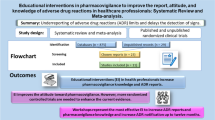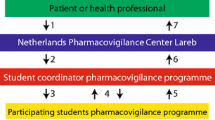Abstract
Background
The yellow-card scheme continues to be one of the principal methods for signal generation in pharmacovigilance. Nevertheless, under-reporting, one of its disadvantages, delays alert signals and has a negative influence on public health. Educational interventions in pharmacovigilance may have a positive impact on the spontaneous reporting of adverse drug reactions (ADRs).
Objectives
To assess the duration of the effect and effectiveness of an educational intervention in pharmacovigilance designed to improve ADR reporting in a robust pharmacovigilance system.
Methods
A spatial, cluster randomized controlled trial was conducted covering all National Health System physicians in the northwest of Spain and targeting those who were actively engaged in clinical practice (n = 7,498). Of these, 2,120 were assigned in three spatial clusters to the intervention group (six hospitals and 138 primary care centers) and 3,614 in four clusters to the control group (seven hospitals and 267 primary care centers). The educational intervention consisted of two complementary approaches—one active (group sessions), the other passive (educational material, reporting form)—implemented from November 2007 to December 2008, with a follow-up period of 8 months.
Results
Intervention participation was 53.7 % in a hospital setting and 60.5 % in primary care settings. ADR reporting in the intervention group increased by 65.4 % (95 % confidence interval [CI]: 8.2–153.4) across the follow-up. The ADR reporting rate per 1,000 physicians/year in the intervention group rose from 28.1 to 39.6 following the intervention (51.7 and 27.4 in the first and second 4-month period, respectively). For the intervention group, relative risk (RR) was 2.31 (95 % CI: 1.46–3.68) and 1.04 (95 % CI: 0.61–1.77) in the first and second 4-month period, respectively adjusted to baseline values. There was an increase in unexpected ADR reporting (RR 2.06, 95 % CI 1.19–3.55).
Conclusions
Pharmacovigilance educational interventions that have proved effective can be successfully applied in different geographical areas. A high baseline notification rate could account for the educational program having a moderate effect.

Similar content being viewed by others
References
Bahri P, Arlett P. Regulatory pharmacovigilance in the European Union. In: Andrews EB, Moore N, editors. Mann’s pharmacovigilance, p. 173. London: Wiley; 2014.
Hazell L, Shakir SA. Under-reporting of adverse drug reactions: a systematic review. Drug Saf. 2006;29(5):385–96.
Directive 2010/84/EU of the European Parliament and of the Council of 15 December 2010 amending, as regards pharmacovigilance, Directive 2001/83/EC on the Community code relating to medicinal products for human use. Off J Eur Union. 2010; L 348:74–99.
van Hunsel F, Harmark L, Pal S, Olsson S, van Grootheest K. Experiences with adverse drug reaction reporting by patients: an 11-country survey. Drug Saf. 2012;35(1):45–60. doi:10.2165/11594320-000000000-00000.
Gonzalez-Gonzalez C, Lopez-Gonzalez E, Herdeiro MT, Figueiras A. Strategies to improve adverse drug reaction reporting: a critical and systematic review. Drug Saf. 2013;36(5):317–28. doi:10.1007/s40264-013-0058-2.
Figueiras A, Herdeiro MT, Polonia J, Gestal-Otero JJ. An educational intervention to improve physician reporting of adverse drug reactions: a cluster-randomized controlled trial. JAMA. 2006;296(9):1086–93. doi:10.1001/jama.296.9.1086.
Herdeiro MT, Polonia J, Gestal-Otero JJ, Figueiras A. Improving the reporting of adverse drug reactions: a cluster-randomized trial among pharmacists in Portugal. Drug Saf. 2008;31(4):335–44.
Lindquist M. The WHO Global ICSR database system: basic facts. Drug Inf J. 2008;42:409–19.
The Uppsala Monitoring Centre: reporting trends. http://www.who-umc.org/DynPage.aspx?id=108476&mn1=7347&mn2=7252&mn3=7322&mn4=7558. Accessed 1st Feb 2013.
Herdeiro MT, Figueiras A, Polonia J, Gestal-Otero JJ. Physicians’ attitudes and adverse drug reaction reporting: a case–control study in Portugal. Drug Saf. 2005;28(9):825–33.
Figueiras A, Tato F, Fontainas J, Gestal-Otero JJ. Influence of physicians’ attitudes on reporting adverse drug events: a case–control study. Med Care. 1999;37(8):809–14.
Hollis S, Campbell F. What is meant by intention to treat analysis? Survey of published randomised controlled trials. BMJ. 1999;319(7211):670–4.
Brown H, Prescott R. Applied mixed models in medicine. 2nd ed. Edinburgh: Wiley; 2006.
StataCorp. Stata statistical software: release 13.1. College Station: StataCorp LP; 2013.
Thomson O’Brien MA, Freemantle N, Oxman AD, Wolf F, Davis DA, Herrin J. Continuing education meetings and workshops: effects on professional practice and health care outcomes. Cochrane Database Syst Rev. 2001;2:CD003030. doi:10.1002/14651858.CD003030.
Biagi C, Montanaro N, Buccellato E, Roberto G, Vaccheri A, Motola D. Underreporting in pharmacovigilance: an intervention for Italian GPs (Emilia-Romagna region). Eur J Clin Pharmacol. 2013;69(2):237–44. doi:10.1007/s00228-012-1321-7.
Goldstein LH, Berlin M, Saliba W, Elias M, Berkovitch M. Founding an adverse drug reaction (ADR) network: a method for improving doctors spontaneous ADR reporting in a general hospital. J Clin Pharmacol. 2013;53(11):1220–5. doi:10.1002/jcph.149.
Herdeiro MT, Ribeiro-Vaz I, Ferreira M, Polonia J, Falcao A, Figueiras A. Workshop- and telephone-based interventions to improve adverse drug reaction reporting: a cluster-randomized trial in Portugal. Drug Saf. 2012;35(8):655–65. doi:10.2165/11599750-000000000-00000.
Pagotto C, Varallo F, Mastroianni P. Impact of educational interventions on adverse drug events reporting. Int J Technol Assess Health Care. 2013;29(4):410–7. doi:10.1017/S0266462313000457.
Pedros C, Vallano A, Cereza G, Mendoza-Aran G, Agusti A, Aguilera C, et al. An intervention to improve spontaneous adverse drug reaction reporting by hospital physicians: a time series analysis in Spain. Drug Saf. 2009;32(1):77–83. doi:10.2165/00002018-200932010-00007.
Bracchi RC, Houghton J, Woods FJ, Thomas S, Smail SA, Routledge PA. A distance-learning programme in pharmacovigilance linked to educational credits is associated with improved reporting of suspected adverse drug reactions via the UK yellow card scheme. Br J Clin Pharmacol. 2005;60(2):221–3. doi:10.1111/j.1365-2125.2005.02419.x.
Clarkson A, Ingleby E, Choonara I, Bryan P, Arlett P. A novel scheme for the reporting of adverse drug reactions. Arch Dis Child. 2001;84(4):337–9.
Gony M, Badie K, Sommet A, Jacquot J, Baudrin D, Gauthier P, et al. Improving adverse drug reaction reporting in hospitals: results of the French Pharmacovigilance in Midi-Pyrenees region (PharmacoMIP) network 2-year pilot study. Drug Saf. 2010;33(5):409–16. doi:10.2165/11319170-000000000-00000.
Welsh CH, Pedot R, Anderson RJ. Use of morning report to enhance adverse event detection. J Gen Intern Med. 1996;11(8):454–60.
Consellería de Sanidade. Sistema Sanitario de Galicia. Memoria 2006. Santiago de Compostela (Spain): Xunta de Galicia, 2008. www.sergas.es. Accessed 26 June 2014.
Lopez-Gonzalez E, Herdeiro MT, Figueiras A. Determinants of under-reporting of adverse drug reactions: a systematic review. Drug Saf. 2009;32(1):19–31. doi:10.2165/00002018-200932010-00002.
Forsetlund L, Bjorndal A, Rashidian A, Jamtvedt G, O’Brien MA, Wolf F et al. Continuing education meetings and workshops: effects on professional practice and health care outcomes. Cochrane Database Syst Rev. 2009;2:CD003030. doi:10.1002/14651858.CD003030.pub2.
Gerritsen R, Faddegon H, Dijkers F, van Grootheest K, van Puijenbroek E. Effectiveness of pharmacovigilance training of general practitioners: a retrospective cohort study in the Netherlands comparing two methods. Drug Saf. 2011;34(9):755–62.
Acknowledgments
The authors would like to thank the Northern Pharmacovigilance Centre, in Portugal, for supplying the data for the year 2003; all the medical practitioners who took part in the intervention; and Michael Benedict for his help with the English version of this paper. Prof. Dr. Adolfo Figueiras’ work on this project was in part funded by the Health Research Fund (Fondo de Investigación Sanitaria) grants PI 081239, PI09/90609 from the Spanish Ministry of Health.
Elena Lopez-Gonzalez, Maria T. Herdeiro, María Piñeiro-Lamas, and Adolfo Figueiras have no conflicts of interest that are directly relevant to the content of this study.
Author information
Authors and Affiliations
Consortia
Corresponding author
Electronic supplementary material
Below is the link to the electronic supplementary material.
Rights and permissions
About this article
Cite this article
Lopez-Gonzalez, E., Herdeiro, M.T., Piñeiro-Lamas, M. et al. Effect of An Educational Intervention to Improve Adverse Drug Reaction Reporting in Physicians: A Cluster Randomized Controlled Trial. Drug Saf 38, 189–196 (2015). https://doi.org/10.1007/s40264-014-0256-6
Published:
Issue Date:
DOI: https://doi.org/10.1007/s40264-014-0256-6




